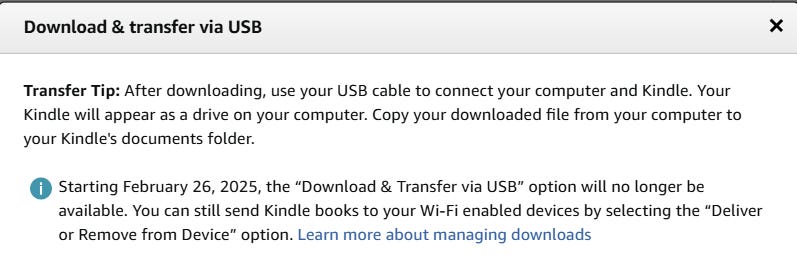Before we get to the meat of this article: I want to apologize for my radio silence the past couple of months. Things have been so hectic I’ve barely had any time to write at all, and I’ve chosen to work on new fiction instead of spend time here. I do feel bad about that, and I hope to stick to a post at least once a month moving forwards. I have one short story that will be out some time this year and a couple of other projects pending. I’ll be sure to send out a message when those get closer to release. In the meantime, thanks for hanging in there with me, it’s much appreciated!
Now, onto the show…
I love my kindle. I got a Kindle 2 right after Amazon released it in 2009; the white one with a tiny keyboard and revolutionary e-ink display. I know some people have strong feelings about physical books, and don’t worry, my library of real books is more than large enough to make my wife shake her head in resignation.
I first bought the Kindle because I traveled a lot and lugging physical books around on a two-week work trip is a real pain when you go through a book in three or four days. The Kindle gave me the ability to carry along a huge library, enough to last me for weeks of reading, with no more trouble than bringing a small notebook. One of the things I appreciated about the Kindle was that I was able to connect it to a computer to upload or download books, including those that were not available as e-books from Amazon. Or from publishers where I’d rather just buy the book from them instead of from Amazon.
At some point Amazon built a ‘Send to Kindle’ app and then an email-based system where you could send files and e-books to a unique email address for your kindle, the file is added to your Amazon library, and it downloaded to your kindle over wifi. But back in the old days you could transfer books to your Kindle via USB.
You could also download Amazon-purchased books from your Kindle. Or you could download them from your Amazon account to a computer and upload to your device.
Recently, Amazon decided to change that. There will be no option to download your ebooks from Amazon. They are stuck in the cloud and will forever be so.
If you’re thinking to yourself, “Zane, that’s exactly the kind of thing a soulless mega-corporation would do. Why are you surprised by this.” Well, yes, you’re right. That IS exactly what Amazon and its army of lawyers would do. I’m not totally surprised by this action, but we’re not done.
My friend Sam at
posted a note with the below communication from Amazon:
The current Amazon terms of use for Kindle products (as of March 24, 2025) reads:
“1. Kindle Content License
Use of Kindle Content. Kindle Content is licensed, not sold, to you by the Content Provider. Upon your download or access of Kindle Content and payment of any applicable fees (including applicable taxes), the Content Provider grants you subject to the terms of this Agreement, including without limitation those in “Changes to Service; Amendments” below, a non-exclusive right to view, use, and display such Kindle Content (for Subscription Content, only as long as you remain an active member of the underlying membership or subscription program), solely through Kindle Software or as otherwise permitted as part of the Service, solely on the number of Supported Devices specified in the Kindle Store, and solely for your personal, non-commercial use. Content Provider may include additional terms for use within its Kindle Content. Those terms will also apply, but this Agreement will govern in the event of a conflict. Some Kindle Content, such as interactive or highly formatted content, may not be available to you on all Kindle Software.
Limitations. Unless specifically indicated otherwise, you may not sell, rent, lease, distribute, broadcast, sublicense, or otherwise assign any rights to the Kindle Content or any portion of it to any third party, and you may not remove or modify any proprietary notices or labels on the Kindle Content. In addition, you may not attempt to bypass, modify, defeat, or otherwise circumvent any digital rights management system or other content protection or features used as part of the Service."
Basically, Amazon is saying you haven’t bought a book at all. You’ve bought the rights to look at that book, but not the book.
To be fair, this isn’t that different from licenses for most digital products, including from other book publishers (See section 9 of Games Workshop’s Terms and Conditions here).
But it feels different to me. I grew up in a pre-digital world, and for a long time physical books were my only source of reading material and something I treasured more than most things I owned. I still have many of the books I bought in those days and I hope that my kids will enjoy them as much as I did. I didn’t buy a license to those books: I bought the book.
Amazon’s recent change of heart is an important reminder of the control that large corporations can exert over our lives. What is given may be taken away at the stroke of some lawyer’s pen.
What happens if Amazon decides to shut down Kindle services like they shut down Kindle Vella? What happens if Amazon goes bankrupt? What happens if Amazon (or an Amazon-operated bot) decided that I’ve violated some term or condition buried in legalese somewhere and locks my account?
If I don’t own these items they might just go away. They’ll stay on my Kindle, but when that dies I am out quite a bit of money that I thought I used to purchase books.
What’s the solution here? Well, in my opinion it’s to look elsewhere beyond Amazon. Amazon claims about 67% of all ebook sales in the United States and 50% of all print books (source). That is huge market share, and it gives them a level of leverage over the market that few others have. They can adjust their terms of service as they see fit and there’s little recourse for us little people.
But there are a few options. Publishers like Games Workshop, Baen, and others sell their own ebooks on their websites. It’s less convenient, yes, but it mostly bypasses Amazon. I am not sure about this, but it’s probably better for the authors as well as Amazon is no longer taking a cut of the sales price. But those companies may have similar terms for their ebooks. I’ve already linked the GW terms, and they’re not that different from Amazon. However, GW doesn’t (yet) have the ability to lock you into a single e-reader ecosystem and control how you access and handle content. You get to download an ebook and read it through whatever method suits you.
You can also make the shift back to physical books. Most of the non-fiction I read is physical books these days. I use a lot of them for reference in various writing projects, especially history books, and I like being able to refer to the physical copies, make annotations, and fill them with sticky notes on important info (see the link below for why and how I do this).
I still love my Kindle and I use it all the time. But I trust Amazon less and less, and that will be a problem. To paraphrase Hemingway, that trust will erode slowly at first, then all at once.







Yeah, this factored in how I delivery my work. I am not too found of this change.